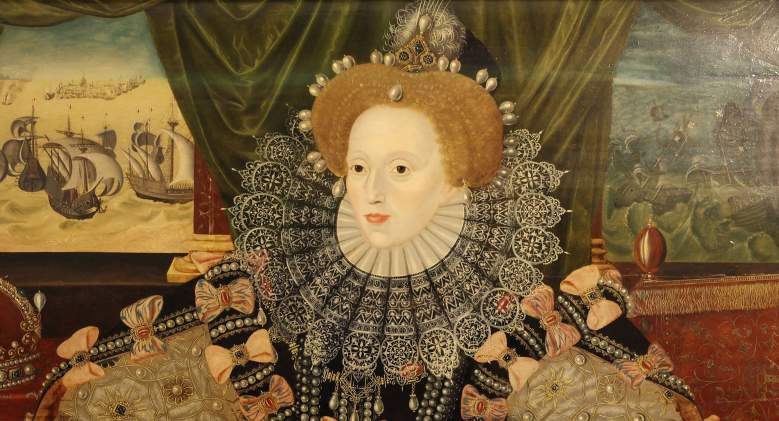
Who was Queen Elizabeth I, the predecessor to England’s Queen Elizabeth II who died on September 8, 2022?
Here’s what you need to know:
1. Elizabeth I the First Was the Only Child of King Henry VIII & Anne Boleyn
Elizabeth I was the only living child of King Henry VIII and his second wife, Anne Boleyn. She was the last of five monarchs in the Tudor dynasty after her half-brother and half-sister.
When King Henry VIII died in 1547, his son Edward VI became king but due to his young age and his ailing health was never really at the helm of the kingdom and he died six years after taking the throne. After his death, Elizabeth’s older sister, Mary Tudor took the throne. She died without an heir and Elizabeth I ascended the throne on November 17, 1558.
“If ever any person,” someone wrote at the time, according to Britannica. “had either the gift or the style to win the hearts of people, it was this Queen, and if ever she did express the same it was at that present, in coupling mildness with majesty as she did, and in stately stooping to the meanest sort.”
2. Elizabeth I Was a ‘Virgin Queen’, & Alleged Affair With Robert Dudley Was Never Confirmed
Throughout her life, Elizabeth I was used as a pawn by the men in her life and as such, choose to never marry. Thus her most famous nickname “The Virgin Queen” was born.
But many historians and the general public have wondered if she and her longtime friend and advisor Robert Dudley were ever an item.
According to English Heritage, Dudley was “the most unpopular man in England” and was accused of being a “serial killer, extortioner and criminal” and historians accepted those claims as truth.
The outlet reported that Elizabeth I was “violently attracted to him, and he to her. Day after day they rode and danced together, or whispered in alcoved. Rumours that they were lovers were rife, and not only at court.”
But Dudley was already married. His wife, Amy Robsart, lived away from court and in 1560 was “found dead with a broken neck.”
But there was never proof that anything actually happened between the two. In fact, the outlet reported that Elizabeth I denied so on her deathbed saying, “though she loved him dearly … nothing unseemly had ever passed between them.”
3. Queen Elizabeth I’s Reign Was Considered the ‘Most Glorious in English History’
Elizabeth I is considered one of the most important monarchs in England’s history. According to Royal.uk, “Her 45-year reign is generally considered one of the most glorious in English history. During it a secure Church of England was established. Its doctrines were laid down in the 39 Articles of 1563, a compromise between Roman Catholicism and Protestantism.”
Because of her sometimes flimsy claim to the throne (she was considered a bastard by her own father), her reign was often fraught with plots against her life, including her most famous enemy, Mary, Queen of Scots.
“As a likely successor to Elizabeth, Mary spent 19 years as Elizabeth’s prisoner because Mary was the focus for rebellion and possible assassination plots, such as the Babington Plot of 1586,” the outlet reported.
Eventually, Mary was tried, found guilty, and beheaded in 1587.
4. Queen Elizabeth I’s Iconic Look Might Have Contributed to Her Death
Many people think of Queen Elizabeth’s red hair and pale white face when conjuring up an image of the late Queen. But that iconic look might have played a part in her death, according to the Royal Museum, Greenwich.
Elizabeth I died in March 1603 at the age of 69, of what people now consider to be blood poisoning, but we’ll never know for sure.
According to the museum, “before her death, Elizabeth refused permission for a post-mortem to be conducted,” leaving her cause of death a mystery.
The website listed three widely debated causes of death for the Queen, one being “blood poisoning, brought on by her use of a lead-based makeup known as Venetian Ceruse (or the spirits of Saturn). This substance was classified as a poison 31 years after Elizabeth’s death.”
The other two are things like cancer or pneumonia and one reason is that she died because “Elizabeth’s coronation ring had grown into her flesh. This was due to the fact that she never had it removed during the 45 years of her reign,” the museum said.
5. Queen Elizabeth I & Queen Elizabeth II Are Related
We already know that Elizabeth I died without marrying and without children. So many people have wondered how she and Elizabeth II are related.
According to Express, Elizabeth I is “distantly related to the current monarch, despite the two Queen’s both being from separate royal houses.”
The outlet reported that “The Queen is related to Elizabeth I via Henry VII’s sister, Queen Margaret of Scotland, according to historian Robert Stedall.”
“By my calculations, this makes Henry VIII, the Queen’s 14 x great uncle, at which level she has a 1/32,768th part of Queen Margaret’s blood,” he said, according to the outlet.